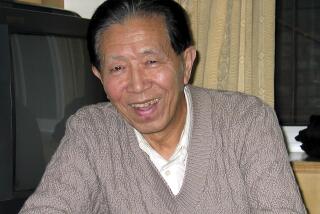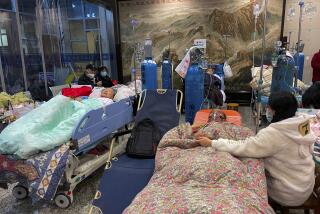SARS Crisis Forces China to Open Up
- Share via
BEIJING — A deadly epidemic runs largely unchecked. Inept officials get the boot. The government admits its own failure and promises to change its ways. This chain of events in China marks a leap forward for this nation’s ossified political system.
The outbreak of severe acute respiratory syndrome, or SARS, in China and the government’s initial poor handling of the crisis has inspired comparisons to the 1986 Chernobyl nuclear disaster, which contributed to the slow unraveling of the Soviet Union, and to the discontent among Chinese that led to the 1989 pro-democracy demonstrations in Tiananmen Square.
However, until the regime’s ongoing battle with the disease plays out, the epidemic’s ultimate political effect is difficult to predict.
The disease is still spreading across the world’s most populous country, where the outbreak originated in November. So far, SARS has killed 506 people and sickened 7,053 around the world. Most of the victims have been in China, where deaths and infections continue -- even as the disease appears to be ebbing in other affected countries.
China fired two top officials last month and acknowledged that the Health Ministry had underreported the number of SARS cases. Political accountability is so rare in this country that this suggestion of change has given many people hope that more has to be on the way.
If the outbreak continues to spread in the vast and impoverished Chinese countryside, the political fallout could be even greater -- and feed suspicions that the system more than the sickness is to blame.
“This is not only a natural disaster, it is a man-made disaster,” said Zhong Dajun, an independent research analyst in Beijing. “Our political system is completely unable to deal with a crisis like this. Even if we win this war, it calls for some serious soul-searching so we can truly learn from the disaster and prevent the next one.”
Already, SARS has become a case study in how much China has changed -- and how much it remains the same. The fact that the virus jumped so quickly from southern China to the rest of the country and beyond reflects the Chinese people’s newfound mobility and integration with the world. Yet the initial lack of corresponding openness in the political system has helped the disease thrive in a country where crisis management still often means hiding the truth and muffling the media.
Even the firings April 20 of the nation’s health minister and Beijing’s mayor have been dismissed by some as a knee-jerk reaction indicative of rule by humans rather than the rule of law.
“I don’t believe this is part of some huge revolution that’s going to throw China open,” said Orville Schell, a longtime China watcher from UC Berkeley. “It’s a time-honored tradition in China when there’s a problem, somebody has to take the fall. They may get rid of a few people, but the same old dysfunctional system continues.”
Underlying China’s reaction to the SARS epidemic has been two decades of turbocharged economic growth and anemic political reforms. The government in effect made a pact with the Chinese people: They could enjoy the freedom to pursue prosperity but had to refrain from making political demands.
The deal rested on the assumption that the regime could keep the economy humming along. Some observers suspect that the government faced up to the SARS outbreak only because it feared that investors would be scared away.
“The Chinese government wouldn’t care how many people died. Think how many people died during the Cultural Revolution and the famines,” said Victoria Tin-bor Hui, a China expert at the University of Illinois at Urbana-Champaign. But when the outside world became aware of the epidemic’s extent, she added, Chinese officials “began to think they could lose more by continuing to hide it and it’s best to play the responsible big power.”
That in itself is a sign of progress because the old China would have preferred to ignore international opinion. But with a disease that knows no borders, the regime can’t afford to remain isolated.
In fact, as the fight against SARS kicked into high gear in recent weeks, some kind of political change appeared inevitable.
Newly appointed Health Minister Wu Yi and acting Beijing Mayor Wang Qishan are considered capable politicians who have been pushed to the front of the battle against SARS, possibly setting the standard for a new kind of politician.
“This epidemic is a huge force for change,” said Zhong, the analyst. “It’s not just political theater. It’s a sign they mean business. They have no choice now but to do the right thing.”
In a possible sign of more media openness, the government on May 2 publicized a submarine accident in the Yellow Sea that killed 70 people. China rarely reports military disasters, and this one is considered one of the worst in communist history.
Over the weekend, Beijing even made a symbolic concession to Taiwan by agreeing that a World Health Organization team could travel to the island to investigate the rising number of SARS cases. Beijing always has insisted that Taiwan is part of China and as such has no right to work with international organizations as a separate entity.
On Wednesday, new Premier Wen Jiabao warned that the outbreak remained a serious concern, particularly in the countryside, where minimal health care is available.
“This is going to be a sad but good experience because in the most concrete way the Chinese leadership has been forced to recognize China’s interdependence with the rest of the world,” Schell said.
The crisis is an early trial by fire for Wen and President Hu Jintao. They took office in March, about the time the outbreak started to spread.
“There are still a lot of uncertainties,” said Cheng Li, a fellow at the Woodrow Wilson Center in Washington. The ultimate result depends on whether SARS “can be controlled in a relative short time. If not, probably Hu will be in trouble.”
Hu and Wen have been working hard to reach out to ordinary citizens in ways not usually done by Chinese leaders: shaking hands with shoppers at supermarkets, talking to nurses in hospitals and eating cafeteria food with college students.
Even the robotic speak of news anchors, who typically parrot official speeches, has given way at times to reports that reveal the voices and emotions of the new leaders. One recent segment showed Hu telling Guangdong officials during a visit there that the epidemic “tugs at the hearts” of the central leadership and makes them “feel anxious.”
If these are signs of better things to come, SARS may turn out to be a catalyst for much-needed political reforms.
“Greater transparency is a irreversible trend,” said Tang Xuemei, an independent pollster in Beijing. Until recently, authorities had tried to stop her company from publicizing a survey on people’s knowledge about SARS. Now the firm has been told to share its latest findings with the media “as long as they are truthful and objective.”
“It’s a small change but a significant change,” Tang said. “Before, suppressing the truth was considered normal. Now they know it could cost officials their jobs. It’s a lesson on the importance of media freedom.”
China is far from granting full press freedom. Though coverage of SARS now saturates the news, the stories are still long on glorifying the sacrifices of medical workers and short on hard-hitting questions about the government’s early coverup of the outbreak and its consequences.
“You can’t have good public health without an open media. You can’t stop an epidemic without a free press, because that’s how people learn what’s going on,” Schell said. “Are they going to throw open the media? I doubt it.”
Even so, the changes so far are seen as positive developments. But should these moves fail to curb the spread of the virus, it could give ammunition to hard-liners to pull China back to a more closed society.
“The other scenario is too ugly to see,” Li said. “That’s why Hu said we should prepare for the worst. He’s talking about the epidemic and China’s future. Good leaders will rise to the occasion. If they fail, we will all be affected, not just those within China but also the international community.”
*
(BEGIN TEXT OF INFOBOX)
SARS cases
Country-by-country breakdown, through Thursday:
Total
probable
cases*...Deaths
Australia...4...0
Britain...6...0
Brazil...2...0
Bulgaria...1...0
Canada...146...22
China...4,698...224
Colombia...1...0
Finland...1...0
France...6...0
Germany...8...0
Hong Kong...**1,661...208
India...1...0
Indonesia...2...0
Italy...9...0
Kuwait...1...0
Macao...**1...0
Malaysia...7...2
Mongolia...9...0
New Zealand...1...0
Philippines...10...2
Poland...1...0
Ireland...1...0
Korea...1...0
Romania...1...0
Singapore...204...27
South Africa...1...1
Spain...1...0
Sweden...3...0
Switzerland...1...0
Taiwan...132...14
Thailand...7...2
U.S....63...0
Vietnam...63...5
Totals...7,053...506
*
Source: World Health Organization
*Cumulative number of reported probable cases
**Special administrative region of China
More to Read
Sign up for Essential California
The most important California stories and recommendations in your inbox every morning.
You may occasionally receive promotional content from the Los Angeles Times.













